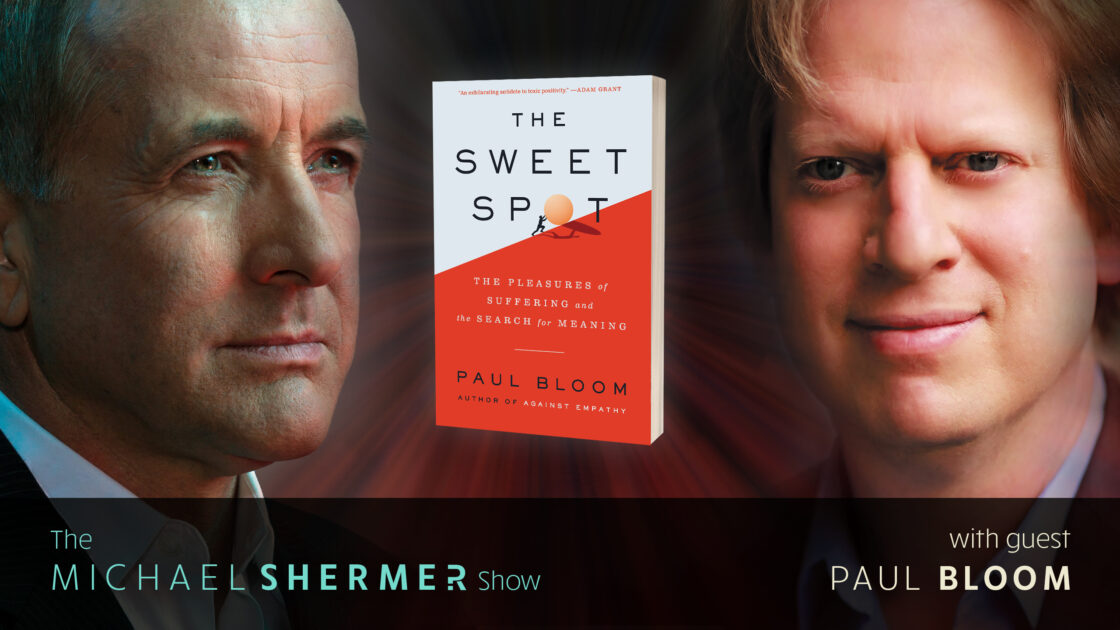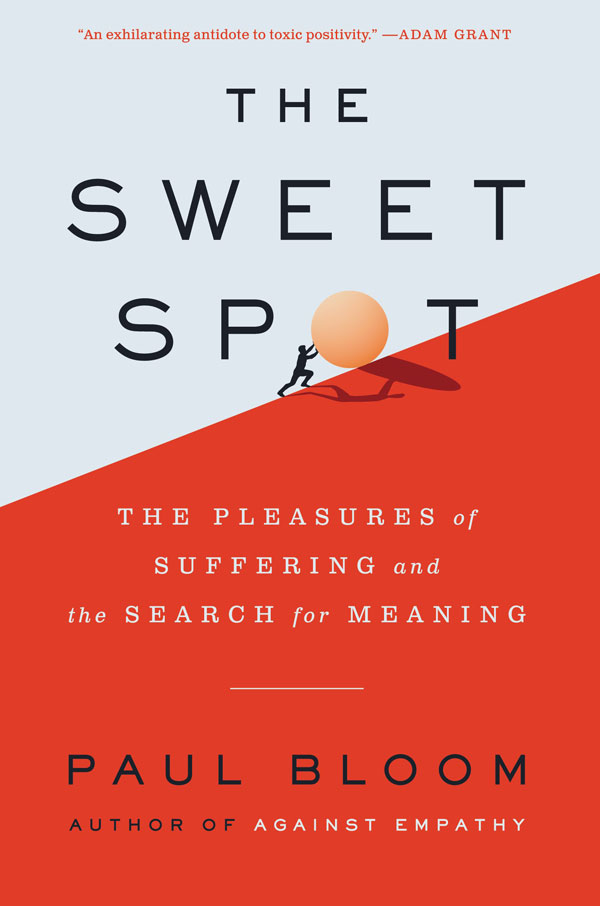As one of the world’s leading psychologists, Paul Bloom studies how we make sense of the world around us. Known for his accessible, witty, and provocative style steeped in years-long research, Bloom has studied everything from the origins of morality and religion (Just Babies and Descartes’ Baby) to the nature of pleasure (How Pleasure Works), to his most recent book, which the New York Times has described as “an invigorating, relevant and often very funny re-evaluation of empathy” (Against Empathy). And now, in The Sweet Spot: The Pleasures of Suffering and the Search for Meaning, Bloom aims to understand how people find meaning in their lives, and, moreover, to explore what he calls, “the sweet spot” — the proper balance between pleasure and suffering.
We go to movies that make us cry, or scream, or gag. We poke at sores, eat spicy foods, immerse ourselves in hot baths, run marathons. Some of us even seek out pain and humiliation in sexual role-play. Why do we so often seek out physical pain and emotional turmoil? Where do these seemingly perverse appetites come from? Drawing on groundbreaking findings from psychology and brain science, Bloom shows how the right kind of suffering sets the stage for enhanced pleasure. Pain can distract us from our anxieties and help us transcend the self. Choosing to suffer can serve social goals; it can display how tough we are or, conversely, can function as a cry for help. Feelings of fear and sadness are part of the pleasure of immersing ourselves in play and fantasy and can provide certain moral satisfactions. And effort, struggle, and difficulty can, in the right contexts, lead to the joys of mastery and flow.
Paul Bloom is Professor of Psychology at University of Toronto, and the Brooks and Suzanne Ragen Professor Emeritus of Psychology at Yale University. His research explores the psychology of morality, identity, and pleasure. Bloom is the recipient of multiple awards and honors, including, most recently, the million-dollar Klaus J. Jacobs Research Prize. He has written for scientific journals such as Nature and Science, and for the New York Times, the New Yorker, and the Atlantic Monthly. He is the author or editor of eight books, including Just Babies, How Pleasure Works, Descartes’ Baby, and, most recently, Against Empathy.
Shermer and Bloom discuss:
- definitions of pleasure and pain,
- What is the value of suffering?
- how effort and struggle and pain are a source of both pleasure and meaning, central to a life worth living,
- what David Hume meant when he wrote: “reason is and ought only to be the slave of the passions, and can never pretend to any other office than to serve and obey them.”
- Jordan Peterson and Slavoj Zizek on suffering. Jordan: “The purpose of life is finding the largest burden you can bear and bearing it.” Zizek: “the only life of deep satisfaction is a life of eternal struggle.”
- controlled vs. uncontrolled suffering,
- motivational pluralism,
- negativity bias and why losses hurt twice as much as gains feel good,
- Victor Frankl’s experience at Auschwitz,
- Why do so many people enjoy spicy foods, painfully hot baths, rigorous exercise, and scary movies?
-
literature/films and suffering: what are the most successful plots in David Robinson’s analysis of 112,000 plots? Six:
- Rags to riches (rise)
- Riches to rags (fall)
- Man in a hole (fall then rise)
- Icarus (rise then fall)
- Cinderella (rise then fall then rise)
- Oedipus (fall then rise then fall)
- Rocky lost the fight but he won his personal battle: “Nobody’s ever gone the distance with Creed. And if I can go that distance, see, if that bell rings and I’m still standing, I’m gonna know for the first time in my life, see, that I wasn’t just another bum from the neighborhood.”
- Fargo: violence cannot be contained,
- revenge tragedy and comeuppance,
- Why do we so often choose to suffer?
- the myth that humans are natural-born hedonists, that the best life involves pursuing pleasure and avoiding pain,
- people who seek out happiness are particularly likely to be depressed and dissatisfied,
- what the best science says about what we should do to live our most fulfilling life,
- Does having children really improve our lives?
- boredom and immortality,
- the difference between happiness and meaningfulness,
- living in the now (2–3 seconds),
- religion and meaningfulness.
If you enjoy the podcast, please show your support by making a $5 or $10 monthly donation.
This episode is sponsored by Wondrium:
This episode was released on November 2, 2021.











